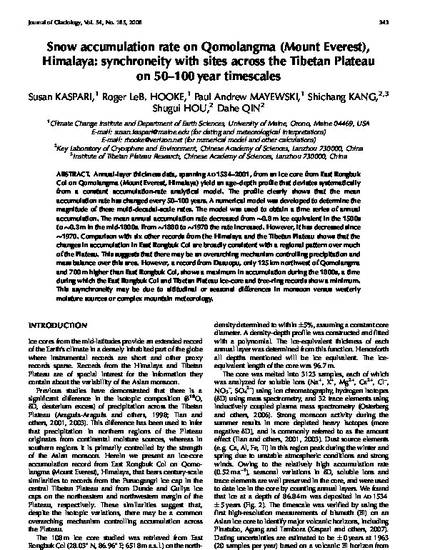
Article
Snow Accumulation Rate on Qomolangma (Mount Everest), Himalaya: Synchroneity With Sites Across the Tibetan Plateau on 50-100 Year Timescales
Journal of Glaciology
Document Type
Article
Rights and Access Note
This Item is protected by copyright and/or related rights. You are free to use this Item in any way that is permitted by the copyright and related rights legislation that applies to your use. In addition, no permission is required from the rights-holder(s) for educational uses. For other uses, you need to obtain permission from the rights-holder(s).
Publication Date
1-1-2008
Disciplines
Abstract/ Summary
Annual-layer thickness data, spanning AD 1534-2001, from an ice core from East Rongbuk Coll on Qomolangma (Mount Everest, Himalaya) yield an age-depth profile that deviates systematically from a constant accumulation-rate analytical model. The profile clearly shows that the mean accumulation rate has changed every 50-100 years. A numerical model was developed to determine the magnitude of these multi-decadal-scale rates. The model was used to obtain a time series of annual accumulation. The mean annual accumulation rate decreased from similar to 0.8 m ice equivalent in the 1500s to similar to 0.3 m in the mid-1800s. From similar to 1880 to similar to 1970 the rate increased. However, it has decreased since similar to 1970. Comparison with six other records from the Himalaya and the Tibetan Plateau shows that the changes in accumulation in East Rongbuk Col are broadly consistent with a regional pattern over much of the Plateau. This suggests that there may be an overarching mechanism controlling precipitation and mass balance over this area. However, a record from Dasuopu, only 125 km northwest of Qomolangma and 700 m higher than East Rongbuk Col, shows a maximum in accumulation during the 1800s, a time during which the East Rongbuk Col and Tibetan Plateau ice-core and tree-ring records show a minimum. This asynchroneity may be due to altitudinal or seasonal differences in monsoon versus westerly moisture sources or complex mountain meteorology.
Citation/Publisher Attribution
Kaspar, S, Hooke, RL, Mayewski, PA, Kang, SC, Hou, SG, and Qin, DH, 2008, Snow Accumulation Rate on Qomolangma (Mount Everest), Himalaya: Synchroneity With Sites Across the Tibetan Plateau on 50-100 Year Timescales: Journal of Glaciology, v. 54, p. 343-352. Available on publisher's site at: http://www.ingentaconnect.com/content/igsoc/jog/2008/00000054/00000185/art00015
Publisher Statement
© Copyright 2008 by the International Glaciological Society
DOI
10.3189/002214308784886126
Version
publisher's version of the published document
Citation Information
Susan Kaspari, Roger Hooke, Paul Andrew Mayewski, Shichang Kang, et al.. "Snow Accumulation Rate on Qomolangma (Mount Everest), Himalaya: Synchroneity With Sites Across the Tibetan Plateau on 50-100 Year Timescales" Journal of Glaciology Vol. 54 Iss. 185 (2008) p. 343 - 352 Available at: http://works.bepress.com/roger_hooke/5/
